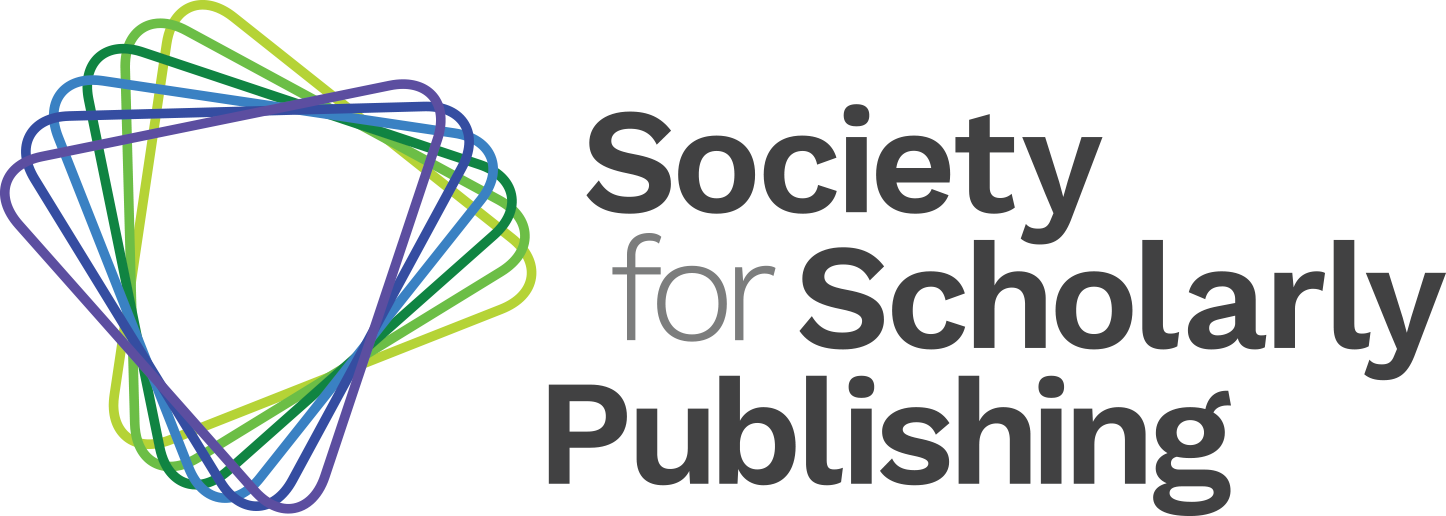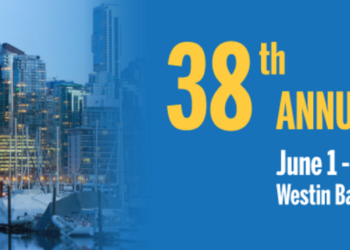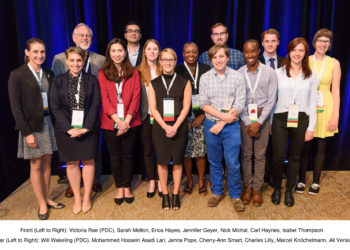This year, the Society for Scholarly Publishing (SSP) Annual Meeting boasted a few firsts. For the first time, the meeting had more than 1000 participants, we welcomed virtual attendees, and launched our new logo and branding. There was energy in the meeting rooms (and the bars!), and lots of interaction in sessions, in hallways, and around Boston. With so much activity and inspiration, this month we asked the Chefs: What Did You Learn at This Year’s SSP Annual Meeting?

Kent Anderson: What I learned at this year’s SSP Annual Meeting is that we are all suffering from the same macro issues — librarians, researchers, academics, scholars, and publishers. We are training people for science careers that are not supported generally — meaning, there is insufficient financial support. This has made the publish-perish paradigm almost existential for young researchers, while libraries are chronically underfunded relative to the rise in publication volumes which publishers are themselves struggling to support. The root cause is a lack of funding for the active scientific communication system that supports careers for research (especially discovery research), scholarship, and information refinement and curation. The effects are short-term thinking, an overemphasis on applied research, and an over reliance on metrics. With more funding at all levels, science, scientific communication, and science education would all benefit. We need to make this clear to policymakers. And that takes long-term thinking, which is in short supply.
Joe Esposito: I was caught by surprise to discover that the place of data analytics in scholarly communications had now mainstreamed. Previously the data game was the province of a handful of individuals and only a couple companies, but now! My gosh, you couldn’t turn around without hearing about a new dashboard, a new set of algorithms.
I think the rapid growth of interest in data analytics has multiple causes, but surely one is that the business people in STM publishing are now forcefully focused on growth. The days of whining about library budgets (and talking to librarians about their needs) are over: growth lies elsewhere. I pity people who make a living doing library surveys and look forward to a SurveyMonkey-free year.
Michael Clarke: At the SSP Annual Meeting this year it became clear that the industry has moved to a new cycle marked by organizations looking beyond their swim lanes. We had long been in a cycle of genteel expansion – with organizations pretty much sticking to their knitting, growing slowly, steadily improving infrastructure, working on processes, building economies of scale, and so on. This period was marked by organizations pretty much staying in their lanes. No longer.
At SSP this year, we saw announcements that Sheridan Press has purchased PubFactory, that Taylor & Francis had purchased Colwiz, and that Clarivate Analytics had purchased Publons. What all of these acquisitions share is that they are expansions outside of the acquiring organization’s core business area (but not too far – they are all close adjacencies). This is on top of many similar recent announcements: Meta acquired by CZI, SSRN acquired by Elsevier, and Atypon acquired by Wiley. What is going on here? While each acquisition has its own logic and set of circumstances distinct from the others, it is clear that the industry has entered a period of strategic realignment and that this realignment is driven by a combination of technology and analytics. Expect to see much more in this vein to follow as organizations reassess where they need to play and how they will win – and what blocking and tackling they will need to do in order to get there.
While each acquisition has its own logic and set of circumstances distinct from the others, it is clear that the industry has entered a period of strategic realignment and that this realignment is driven by a combination of technology and analytics.
Alison Mudditt: We’ve been talking for a number of years about a world in which the final published article loses its primacy and is simply one object in the research cycle, and this year at the SSP Annual Meeting it hit me that we are now very much in that new world. The article (and, for now at least, journal) remains a critical component, but as publishers we now need to actively engage with a wide range of outputs, as well as keeping pace with rapidly changing policies and expectations.
The quick and dramatic rise of preprints is one example of this. While arXiv has been around for nearly three decades, it’s only over the past couple of years that we’ve seen a remarkable increase in preprint repositories along with significant increase in their use in the biological sciences. The same is true of data publication. Both of these initiatives are part of a wider push to accelerate scientific communication and discovery, increase transparency, and foster reproducibility, and are situated in a world where powerful funders such as the Gates Foundation and Wellcome Trust are increasingly setting the agenda for open science.
While arXiv has been around for nearly three decades, it’s only over the past couple of years that we’ve seen a remarkable increase in preprint repositories along with significant increase in their use in the biological sciences.
Are we witnessing the beginnings of true revolution in scientific publishing? None of this means that scientists are about to eschew traditional journals, but I see this as an incredibly exciting opportunity for us as publishers to embrace these new paradigms and make important contributions to impacting discovery and policy at a critical time for science.
Alice Meadows: SSP’s annual meeting is always a highlight of my professional year — and especially when it’s in my adopted home city of Boston! This year’s conference had a somewhat different feel to previous years. Both keynotes, while informative and interesting, painted a rather gloomy picture of the scholarly research ecosystem — inevitable probably, given our current grim political reality. And many conversations also drifted towards the potential consequences of Brexit and Trump. However, an important lesson from pretty much every session I attended was that where there’s a threat there’s also an opportunity. This was very much brought home to me — and, hopefully, everyone else — in the final question of the final session, when Christen Pruitt, one of this year’s SSP Fellows, asked the assembled Chefs whether she and other millennials should feel optimistic or jaded about their prospects. Despite the huge challenges we are facing — in scholarly communications and our wider society — there was agreement (for once!) among the Chefs that the future holds many opportunities for our industry that early career professionals will both contribute to and benefit from.
I was also delighted that diversity was once again on the agenda. Rebecca McLeod put together a great panel of speakers, who primarily addressed the important issue of racial diversity in scholarly publishing — the first such session, I believe, for SSP. Diversity in all shapes and forms is an issue that the SSP Board is committed to addressing, so look out for more on this in future!
Rick Anderson: This year what struck me hardest was the opening keynote address by Paula Stephan. I’ve long been concerned about the plight of postdocs in academia, but the statistics Dr. Stephan provided really brought home to me for the first time how dire the situation is for young PhDs looking for tenure-track work. It seems to me that the fundamental problem is a structural one: universities have nothing but incentives both to contribute to this problem and to perpetuate it: a glut of PhDs on the job market only benefits the university. Of course, there’s no reason why these young scientists and scholars have to stay in academia — but I worry that at many of our institutions, we’re not doing enough to give them a realistic understanding of what their options really will be upon graduation.
Lettie Conrad: At this year’s SSP Annual Meeting, I observed some new gaps between our technological advancements and the information practices of publishers and researchers alike — opportunities in data analytics and text/data mining in particular are still in heavy “storming” phases, where computational capabilities and human-information needs are not moving at the same pace or in the same directions. I learned that many publishers are increasingly investing in software and related services, a sign that the art and science of publishing as a practice is evolving. I learned that libraries-as-publishers is a model that’s gaining steam and bringing some innovative approaches to the community, informed directly by insights into the researcher experience. With higher-than-ever attendee rates, I learned that our global community is growing ever more diverse in their scope of content, in their world views, in their expertise, and in their vision for the future of academic publishing.
…many publishers are increasingly investing in software and related services, a sign that the art and science of publishing as a practice is evolving.
David Smith: I learned that Diversity as an issue is starting to grow in importance in our industry. And about time.
I learned that sometimes the keynote speaker can be overtaken by events — the argument that the Trump Administration is not “anti-science” suffering a rather fatal blow (no matter how well argued) a few hours later as the USA pulled out of the Paris Climate Accord.
I learned that in the USA (in particular) there are structural problems with the flow of science (people / funding / goals) that look to be very problematic indeed for the nation. But one country’s problems are another nation’s opportunities. Science will be fine. But these core problems dwarf discussions about open data or the role of preprint servers or open access, etc., etc. For science to move forward (if indeed it needs to) these structural issues will need to be changed before any of the other things will matter a damn.
We are always asked if we are at a crossroads. Previously this has been about surfing the waves of technology that have broken over our bows in the past 15 years. We’ve crossed most of them and really, they turned out not to be highways, but back roads and dirt tracks. But this time does feel different. This time it feels like the geopolitical realignments that are happening around us might well impinge significantly on the USA and the UK in particular. The EU and indeed Asia looked well placed to benefit from the strategic changes at play in our two countries.
And finally, I learned that some smart people are doing some really clever thinking about improving the article for the benefit of those who want to make use of the data, or in this case any computer code contained therein. So, I’m giving a special shout out to Code Ocean, whose web based computational platform offering is something I want to understand a lot more. If you publish code on behalf of the research communities you support, you should check them out.
Judy Luther: I’m glad to see topics that have previously appeared in technology oriented sessions now appearing scattered throughout the SSP Annual Meeting program. In the aggregate, they represent an expansion of focus from the scholarly communication record to the larger research process including a focus on the user of the content. Here are the topics that caught my attention:
- Content A unit of information in digital form that [ideally] can be identified, linked to and potentially reused.
- Containers Books and journals that present information in a structured way for what used to be a printed page.
- Mobile first Content display on a mobile device matters to Google and affects its rank in search results.
- Personas Representations of categories of users – whether they are authors, readers, or other stakeholders.
- Alignment Content – its creation, acquisition and use — needs to be aligned with the organization’s objectives. This applies to publishers and librarians.
- UX / UI User Experience (UX) and User Interface (UI) include a range of activities that affect the ability of a product or service to effectively meet the needs of a user.
- AI Artificial intelligence is the performance of a set of tasks by machines. For example, semantic enrichment combined with established rules, can enable ‘intelligent’ results beyond those searched for by the user.
- Machine learning The process by which a machine goes beyond what it has been programmed to do. For example, a machine analyzes pattern data to determine the connections between concepts.
While all of these topics are energizing, the most satisfying part of the SSP Annual Meeting this year was the experience of being partnered with an SSP Fellow and being able to introduce them to the SSP Community. What a great way to get acquainted with individuals who bring fresh insights to their new roles in our industry!
Ann Michael: There was so much going on at the SSP Annual Meeting, it was hard to take it all in. As some have already stated, I too was delighted to hear so much about data analytics and data driven decision making. While most present were still working through what that means to them, it was top of mind. How encouraging!
The Kitchen was the closing session of the meeting. I was encouraged during that session that our conversation was not only about the challenges and opportunities of technology, business models, content creation, strategy, and the like, but also about inclusion. As someone at the meeting said to me, SSP is a family reunion. It is my sincere hope that everyone attending the meeting grows the feel that way. We don’t all agree (how refreshing), but we are all part of this community!
It also struck me that personally I was not doing everything I could, or should, be doing to help people feel welcome here at the Kitchen and to encourage the participation of diverse voices.
So all I can say is please – please come in, grab a drink, and put your feet on the table if you want. Let’s try to have some lively conversation and disagreement, but let’s be sure to keep it respectful and avoid fist fights. You are welcome here!!
So now it’s your turn to tell us: What Did You Learn at This Year’s SSP Annual Meeting?
Discussion
5 Thoughts on "Ask The Chefs: What Did You Learn At This Year’s SSP Annual Meeting?"
I’m glad that issues of discovery and the user experience were featured so prominently. That discovery piece is massively important as is the seamless or at least very low friction ability to go from discovery to delivery. In my view, that connection is where we should all be focusing our attention. We also need to find ways to improve the metadata or display or something to help give the context of articles. In my work as an instructor it’s painfully clear that our undergrads see only the content, not the age or audience for the article.
Interesting read, on starting out I was expecting there to be much more on Artificial intelligence. The fact it is only mentioned once was a surprise.
I watched the SSP Meeting Virtually. What I learned from the sessions I tuned in to was that new ideas, trends, setbacks, etc. are constantly popping up in our industry every year. I think this meeting is a great way for everyone to get together and discuss these topics. I learned a lot about the value of communication through media and what the future of scholarly publishing looks like. It may seem bleak to some, but I see great concepts being applied and look forward to the future!



